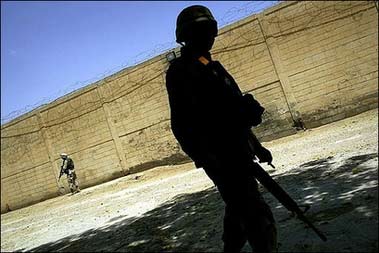
US soldiers secure a building holding Iraqi
detainees at Abu Ghraib prison outside Baghdad, in 2004. A
California-based filmmaker has filed a lawsuit here against top military
officials over his detention by US forces in Iraq in 2005, court documents
filed here show. [AFP] |
A California-based filmmaker has filed a lawsuit in Los
Angeles against top military officials over his detention by US forces in
Iraq in 2005, court documents filed here show.
Cyrus Kar, 45, filed his case in US federal court in Los Angeles on Friday,
arguing that his rights and the treatment of prisoners of war under the Geneva
Convention were violated when US forces detained him for 55 days between May and
July 2005.
Secretary of Defense Donald Rumsfeld and the US military commander in Iraq,
General George Casey, are named as defendants in the case.
Kar was in Iraq working on a documentary on Persian emperor Cyrus the Great
(576-529 BCE) when US soldiers arrested him and his Iranian cameraman at
checkpoint northeast of Baghdad on May 17.
Soldiers said they found washing machine timers -- often used as key parts
for roadside bombs in Iraq -- inside the taxi the two were traveling in.
Kar, a US navy veteran of Iranian ancestry, was set free only after the
American Civil Liberties Union (ACLU) sued for his release.
Kar became a US citizen in 1966 after immigrating to the United States with
his family from Iran.
According to the lawsuit, Kar was hooded and handcuffed when he was
transported to a detention center, where he was aggressively interrogated and
was exposed to hours in the sun in extremely hot temperatures.
A soldier at the notorious Abu Ghraib prison outside Baghdad even slammed his
head into a concrete wall at one point, according to the suit.
"For almost two months, Mr. Kar sat alone for 23 hours each day in a cramped
jail cell, not knowing why he was there or whether he would ever be released,"
reads the lawsuit, filed on Kar's behalf by the ACLU.
Even though FBI agents cleared him of suspicion, he did not have access to an
attorney and was able to make only a few short phone calls to his family. And
the US military did nothing to send him home even after a military panel
recommended his immediate release, according to the court
papers.